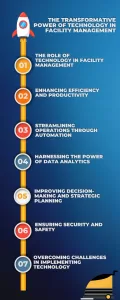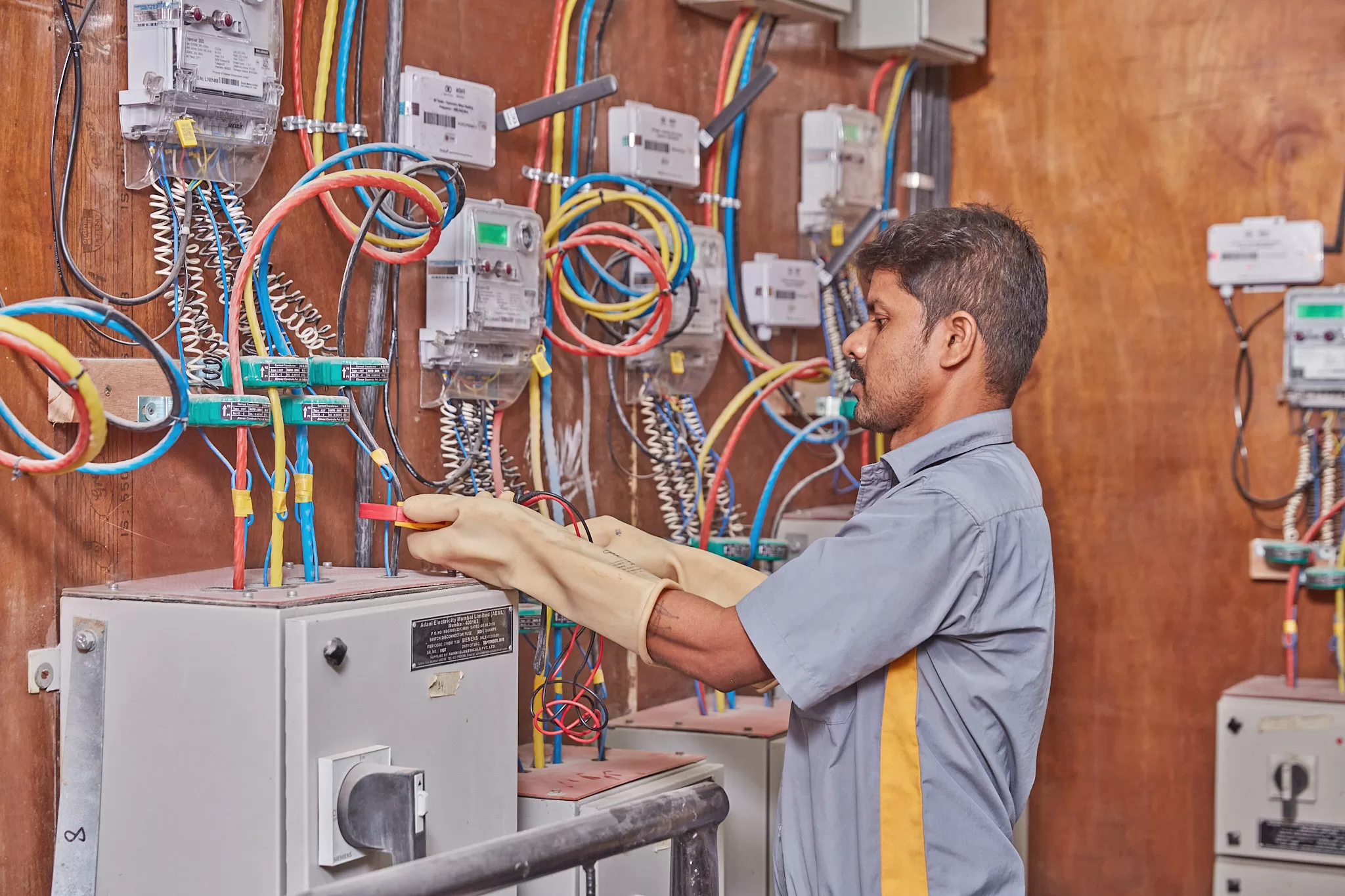1. Introduction
Facility management is an essential aspect of running any business or organization, ensuring that the physical environment is maintained and optimized for both employees and customers. In recent years, technology has played a transformative role in the field of facility management, offering innovative solutions and streamlining processes. From integrated facility management services to top-rated property management companies, advancements in technology have revolutionized the way facilities are managed. This blog will explore the transformative power of technology in facility management, as well as highlight the top facility management companies in Mumbai, Bangalore, and India as a whole. Additionally, we will delve into the benefits of housekeeping services and property management services in this modern era of facility management.
2. The role of technology in facility management
Technology has undeniably revolutionized the field of facility management, providing innovative solutions that have streamlined processes and improved overall efficiency. One of the key roles technology plays in facility management is the integration of various systems. With the help of advanced software and IoT devices, facility managers can now monitor and control multiple aspects of a building’s infrastructure, such as HVAC, lighting, security, and energy management, from a centralized platform.
Moreover, technology has made maintenance and repairs more proactive and cost-effective. Predictive maintenance algorithms can analyze data from sensors and detect potential issues before they become major problems, allowing facility managers to address them promptly and avoid costly breakdowns. Additionally, technology-enabled asset management systems help in tracking and optimizing the lifespan of equipment, ensuring timely replacements and reducing downtime.
Furthermore, the use of mobile apps and cloud-based platforms has made communication and collaboration between facility managers, staff, and tenants seamless and efficient. Real-time updates, automated reporting, and digital documentation enable effective communication and ensure that everyone involved stays informed and engaged.

3. Enhancing efficiency and productivity
One of the most significant ways technology has transformed facility management is by enhancing efficiency and productivity. The integration of smart sensors and IoT devices has enabled real-time data collection and analysis, providing facility managers with valuable insights into building performance and resource utilization.
For instance, occupancy sensors can detect the presence of people in a room and adjust lighting and HVAC systems accordingly, reducing energy waste. Advanced analytics software can analyze data from various systems to identify patterns and trends, enabling facility managers to make informed decisions about resource allocation and optimize operational processes.
Moreover, technology has automated time-consuming tasks and streamlined workflows. For example, computerized maintenance management systems (CMMS) allow facility managers to schedule preventive maintenance, track work orders, and manage inventory seamlessly. This automation reduces administrative overhead and ensures that critical maintenance tasks are completed on time, improving overall efficiency.
Furthermore, the use of mobile apps and cloud-based platforms has enabled facility managers and staff to access necessary information and collaborate remotely. Whether it’s accessing maintenance records, submitting service requests, or communicating with team members, technology has made these tasks faster and more accessible, allowing facility managers and staff to be more productive.
4. Streamlining operations through automation
Another way technology has transformed facility management is through automation. By implementing intelligent systems and software, facility managers can streamline operations, optimize processes, and improve overall efficiency.
One area where automation has made a significant impact is in the realm of maintenance management. Computerized maintenance management systems (CMMS) have revolutionized how maintenance tasks are handled. These systems allow facility managers to schedule preventive maintenance, track work orders, and manage inventory seamlessly, reducing the risk of breakdowns and improving the lifespan of equipment.
Additionally, automation has improved the workflow of daily tasks. For instance, smart building management systems can automatically adjust lighting, temperature, and other environmental factors based on occupancy. This not only ensures optimal comfort for occupants but also reduces energy waste, resulting in significant cost savings.
Moreover, the use of automation in facility management extends to areas such as security and access control. Advanced security systems equipped with facial recognition technology and automated access control systems improve safety and enhance operational efficiency.
By automating time-consuming and repetitive tasks, technology allows facility managers to focus on strategic planning and decision-making. This leads to improved productivity and the ability to allocate resources more effectively.
5. Harnessing the power of data analytics
Automation in facility management has not only improved operational efficiency but also opened up new opportunities for cost optimization. The transformative power of technology lies in the ability to capture and analyze vast amounts of data generated by various systems.
Data analytics is now at the forefront of facility management, allowing managers to make data-driven decisions and identify areas for improvement. By harnessing the power of data analytics, facility managers can gain valuable insights into energy consumption patterns, space utilization, and equipment performance.
For example, by analyzing energy usage data, facility managers can identify inefficiencies and implement strategies to reduce energy consumption, resulting in substantial cost savings. Data analytics also enables the optimization of space utilization, ensuring that every square foot is utilized effectively and minimizing wasted space.
Moreover, facility managers can utilize predictive maintenance through data analytics to anticipate equipment failures and schedule maintenance proactively, reducing downtime and avoiding costly repairs.
In addition to operational optimization, data analytics can also provide valuable insights for strategic planning. By analyzing trends and patterns, facility managers can forecast future needs, allocate resources effectively, and make informed decisions regarding long-term investments.
6. Improving decision-making and strategic planning
Data analytics not only brings operational efficiency and cost optimization in facility management but also plays a vital role in improving decision-making and strategic planning. By leveraging the power of data analytics, facility managers can make informed decisions regarding resource allocation, long-term investments, and strategic initiatives.
Through data analysis and trend identification, facility managers can gain valuable insights into occupancy patterns, tenant preferences, and facility needs. This information helps in forecasting future demands, identifying market trends, and tailoring services to meet the evolving needs of tenants.
Data-driven decision-making also allows facility managers to proactively address potential issues and minimize risks. By analyzing historical data and industry benchmarks, managers can develop contingency plans, implement preventive maintenance strategies, and ensure business continuity.
Furthermore, data analytics provides facility managers with valuable feedback on the effectiveness of current initiatives and actions. By monitoring key metrics and performance indicators, managers can evaluate the success of implemented strategies, identify areas for improvement, and reallocate resources accordingly.
7. Ensuring security and safety
With the rapid advancement of technology in facility management, ensuring the security and safety of a facility has become easier and more effective than ever before. Technology has provided facility managers with innovative tools and systems that help monitor and manage security measures, ensuring the protection of both the facility and its occupants.
One such tool is the use of advanced surveillance systems. With high-definition cameras, facial recognition capabilities, and video analytics, facility managers can monitor every corner of the facility in real-time. This not only helps in deterring potential threats but also allows for quick response in the event of an emergency.
Additionally, access control systems have revolutionized the way facilities manage entry and exit points. With the integration of smart card or biometric identification systems, facility managers can restrict and track access to the facility, ensuring only authorized individuals can enter. This enhances security and reduces the risk of unauthorized access or incidents.
Furthermore, technology has also improved safety measures within facilities. Fire detection and suppression systems, for example, have become more advanced, with early warning systems that can detect smoke or heat before a fire even starts. This enables facility managers to take necessary actions promptly, minimizing the risk of fire-related incidents.
8. Overcoming challenges in implementing technology
Implementing technology in facility management can bring many benefits, but it is not without its challenges. One of the main challenges is the initial investment required to adopt and integrate new technologies. Facility managers often face budget constraints and may find it difficult to justify the expense of purchasing and implementing new systems.
Another challenge is the resistance to change from employees or stakeholders who may be hesitant to embrace new technologies. This resistance can stem from a lack of understanding or fear of job displacement. It is crucial for facility managers to address these concerns and provide proper training and support for employees during the transition.
Furthermore, integrating different technologies and systems can be a complex process. Facility managers need to ensure that these technologies are compatible and can communicate effectively with each other. This requires careful planning and coordination to avoid any technical glitches or compatibility issues.
To overcome these challenges, facility managers can start by conducting a thorough cost-benefit analysis to demonstrate the long-term value of implementing technology. They can also involve employees in the decision-making process and provide comprehensive training to address any resistance to change. Additionally, partnering with experienced technology providers can help ensure a smooth integration of various systems.
By addressing these challenges, facility managers can maximize the transformative power of technology and unlock the full potential of their facilities.
9. The future of technology in facility management
As facility managers continue to embrace technology, the future looks even more promising. Advancements in artificial intelligence (AI) and the Internet of Things (IoT) are revolutionizing the way facilities are managed. AI-powered analytics can help facility managers identify patterns and anomalies in data, enabling proactive maintenance and optimizing energy consumption.
IoT devices can provide real-time data on everything from occupancy levels to temperature and air quality, allowing facility managers to make informed decisions and improve the overall experience for occupants. Smart sensors and building automation systems can work together to optimize energy usage, reducing costs and minimizing environmental impact.
Moreover, cloud-based platforms are becoming increasingly popular for managing facility operations. These platforms allow for centralized data storage, collaboration, and remote monitoring, making it easier for facility managers to access critical information and streamline their processes.
Looking ahead, technology will continue to enhance facility management practices. Integrated systems that offer predictive maintenance, energy optimization, and enhanced occupant comfort will not only improve the efficiency of facility operations but also contribute to sustainability efforts.
10. Conclusion: Embracing the transformative power of technology
In conclusion, the transformative power of technology in facility management cannot be underestimated. As discussed in this blog, advancements in AI, IoT, and cloud-based platforms are revolutionizing the way facilities are managed. These technological tools enable facility managers to proactively address maintenance issues, optimize energy consumption, and improve the overall experience for occupants.
While there may be challenges in implementing technology, the benefits far outweigh the initial investment and hurdles. Integrated systems that offer predictive maintenance, energy optimization, and enhanced occupant comfort not only improve operational efficiency but also contribute to sustainability efforts.
SILA adopts a tech-driven approach, utilizing Robotics and IoT, Automated Compliance Management, and our proprietary technology (SILA Connect) to efficiently manage properties across India. As pioneers in technology within the facility management sector, SILA stands out as one of the best facility management service provider in India.
To delve deeper into our integrated facility management services, click here.
Industries We serve –
Commercial Offices & Buildings | Manufacturing & Heavy Industrial Facilities | Residential Complexes & Townships | Hotels & Campuses | Airports & Malls | IT Parks & Data Centers | Warehousing & Logistics Parks | Banks & Retail
Present in 125 cities –
Ahmedabad | Baroda | Bengaluru | Chennai | Bhubaneswar | Delhi | Gurugram | Noida | Kolkata | Hyderabad | Kochi | Mumbai | Pune & more
Get a free quote today, to reduce your facility management cost.
FAQs
What are the key challenges faced in Facility Management?
Challenges may include maintaining ageing infrastructure, ensuring compliance with industry regulations, optimizing energy usage, managing risks associated with hazardous materials, and adapting to technological advancements.
2. What are the hard services in facility management?
Hard services in facility management refer to the physical and structural elements that are essential for the operation, functionality, and maintenance of a facility. These services typically involve machinery, systems, and infrastructure. Some examples of hard services include mechanised cleaning services, managing & maintaining HVAC and Electrical Systems, Plumbing and Water Management, Fire Safety and Security Systems, Waste Management etc.
3. How does outsourcing Facility Management lead to cost savings?
Facility Management proves to be cost-effective. Managing spaces in-house can incur significant expenses. However, outsourcing it not only reduces the time your staff spends overseeing facility operations but also results in long-term savings.
4. What is mechanized housekeeping?
Mechanized housekeeping refers to the use of machinery, equipment, and automated tools in performing various cleaning tasks and maintenance activities within a commercial or residential space. This approach involves the use of specialized cleaning equipment such as vacuum cleaners, floor scrubbers, polishers, steam cleaners, pressure washers, and robotic devices designed to automate or simplify cleaning processes.
About SILA -
SILA – A Real Estate platform driven by an entrepreneurial spirit.
Our businesses include Real Estate Services which offer Facility Management, Contracting Solutions and Real Estate Advisory. Our other business is Real Estate Development. We have a diverse client base in various sectors which include large Corporates, Real Estate Funds, Landowners and Developers.
Over the last decade, SILA has scaled efficiently, managing over 150 million square feet of assets, with over 20,000 employees pan India. The platform is backed by Norwest Venture Partners and Samara Capital Group in our Real Estate Services and Development arms, respectively.
SILA is one of the best facility management service provider in Mumbai, Bengaluru, Delhi, Chennai, Hyderabad, Pune & more.
SILA is among the top facility management companies in India, offering comprehensive property management services and housekeeping solutions. As a leading facilities management company, SILA provides tailored FM solutions, including housekeeping services in Mumbai. Leveraging our expertise, we ensure seamless property management for clients nationwide. Whether you require housekeeping agency support or specialized facility management solutions, SILA delivers excellence in every aspect of your property’s upkeep and maintenance.

Aniket Sheth
About Author -
The insightful content in this blog is curated by Aniket Sheth, our esteemed Senior Vice President of Operations. With an impressive professional journey spanning over 13 years, Aniket has held key positions at prestigious brands, showcasing his exceptional leadership skills.
Aniket’s educational background is marked by an MBA from Cornell University, which laid the foundation for his successful career. He began his professional journey at EY in New York, contributing significantly to enhancing and implementing engagements for Fortune 500 companies.
Aniket’s strategic acumen, proficiency in asset management, and forward-thinking innovation have been instrumental in helping companies streamline their operations and achieve substantial cost reductions. His wealth of experience brings a unique perspective to the world of facilities management, making his insights invaluable for businesses seeking operational excellence.


